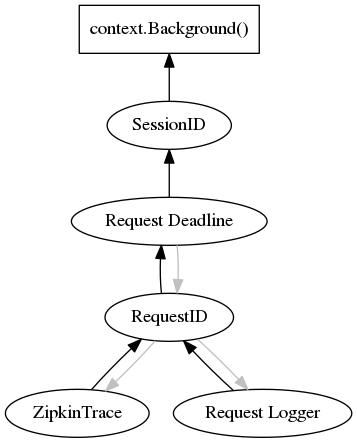You pretty much listed your options. The answer you're seeking for depends on how you want to use the values stored in the context.
context.Context is an immutable object, "extending" it with a key-value pair is only possible by making a copy of it and adding the new key-value to the copy (which is done under the hood, by the context package).
Do you want further handlers to be able to access all the values by key in a transparent way? Then add all in a loop, using always the context of the last operation.
One thing to note here is that the context.Context does not use a map under the hood to store the key-value pairs, which might sound surprising at first, but not if you think about it must be immutable and safe for concurrent use.
Using a map
So for example if you have a lot of key-value pairs and need to lookup values by keys fast, adding each separately will result in a Context whose Value() method will be slow. In this case it's better if you add all your key-value pairs as a single map value, which can be accessed via Context.Value(), and each value in it can be queried by the associated key in O(1) time. Know that this will not be safe for concurrent use though, as a map may be modified from concurrent goroutines.
Using a struct
If you'd use a big struct value having fields for all the key-value pairs you want to add, that may also be a viable option. Accessing this struct with Context.Value() would return you a copy of the struct, so it'd be safe for concurrent use (each goroutine could only get a different copy), but if you have many key-value pairs, this would result in unnecessary copy of a big struct each time someone needs a single field from it.
Using a hybrid solution
A hybrid solution could be to put all your key-value pairs in a map, and create a wrapper struct for this map, hiding the map (unexported field), and provide only a getter for the values stored in the map. Adding only this wrapper to the context, you keep the safe concurrent access for multiple goroutines (map is unexported), yet no big data needs to be copied (map values are small descriptors without the key-value data), and still it will be fast (as ultimately you'll index a map).
This is how it could look like:
type Values struct {
m map[string]string
}
func (v Values) Get(key string) string {
return v.m[key]
}
Using it:
v := Values{map[string]string{
"1": "one",
"2": "two",
}}
c := context.Background()
c2 := context.WithValue(c, "myvalues", v)
fmt.Println(c2.Value("myvalues").(Values).Get("2"))
Output (try it on the Go Playground):
two
If performance is not critical (or you have relatively few key-value pairs), I'd go with adding each separately.


sync.Map? I guess it would get the best of everything. – Griffin